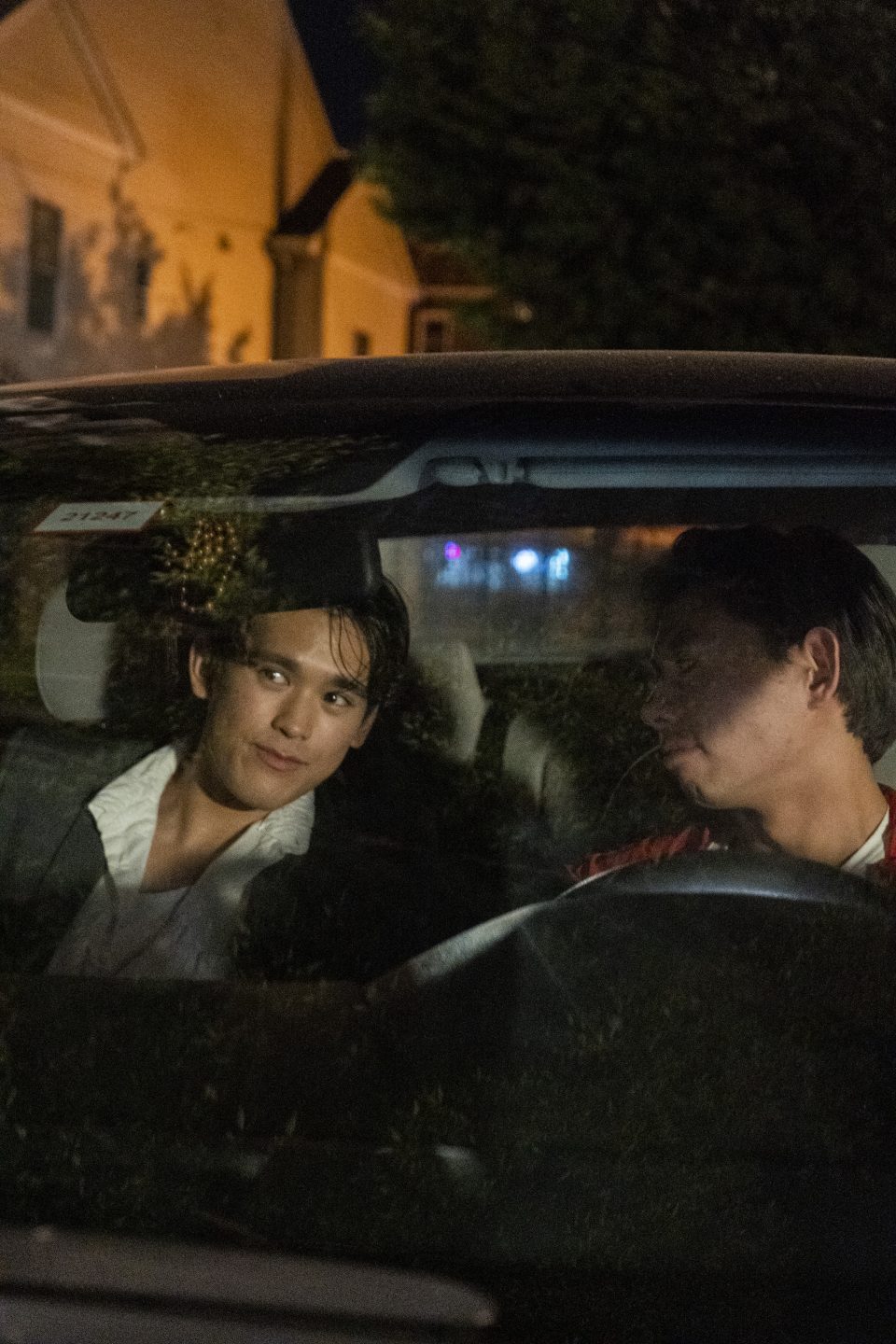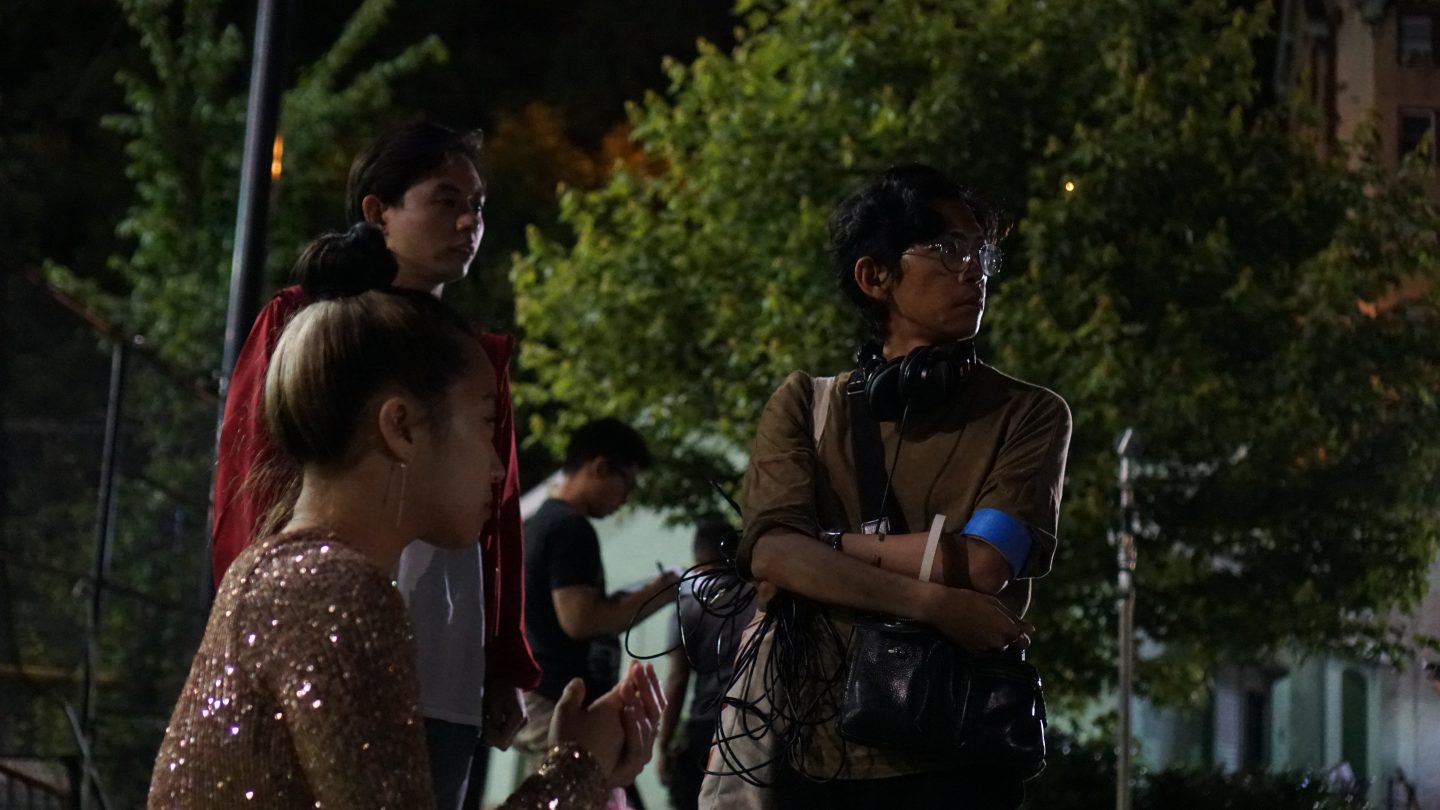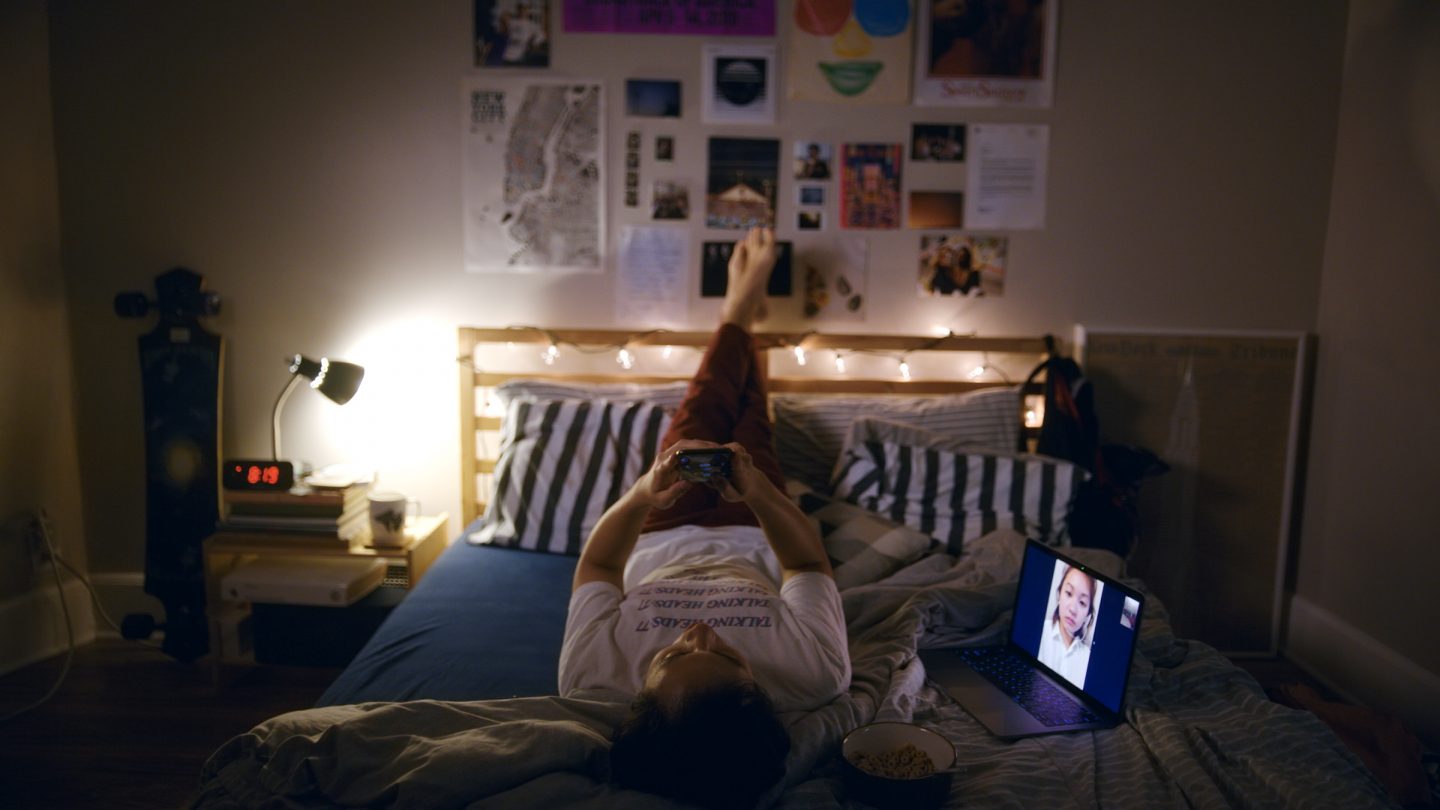We know the overseas Filipino worker (OFW) storyline way too well. Our films and TV shows dub them mga bagong bayani—and they’re right. The acronym itself reflects the sacrifices and acts of selflessness common to the industry. There’s loneliness thanks to the distance from loved ones, fatigue from hustling twice as hard in a country not your own and always putting yourself last to provide better opportunities for your family.
Read more: This student short film about mental health is going to Cannes
This is what being an OFW means. Or at least this is what iconic films like Rory Quintos’ “Anak” and Cathy Garcia-Molina’s “Hello, Love, Goodbye” taught us. Being an OFW is much more complicated than Filipino dramas. According to our former graphic designer Renz Mart Reyes, “outdated na ’yung notion na kapag nag–OFW ka, it gets better.” The OFW experience is more nuanced and layered than we think.
In Martin Diegor (a.k.a Scout’s former art director) and Anjelica Florendo’s short film “Homebound,” they explore how the OFW experience goes beyond stories of sacrifice and selflessnes, and into discovering yourself in a land that’s not your own while carrying that yearning for home.
“It’s a coming-of-age film framed through the lens of the modern Filipino-American story—exploring the highs of being true to yourself, following your dreams, the pains of leaving home,” director Anjelica explains. “It’s also our love letter to friendship, to the old ones we left back home and the new ones we found here,” co-director Martin continues.
Read more: The kids are alright: What happens to the kids OFWs leave behind
“Homebound” is about Nico, an 18-year-old who’s in love with three things: music, New York and his new best friend Jonathan—but no one knows about the last part. The film begins with an evening with Jonathan as Nico debates with himself if he should act on his feelings or not.
“Homebound” is about realizing that home is not a place but a feeling of belonging.
Inspired by a well-curated playlist of homegrown and U.S. indie artists, while taking notes from coming-of-age films like “Alex Strangelove” and “I’m Drunk I Love You,” this short film is a product of influences and personal experiences. It’s a fast-paced rom-com with the realness of coming-of-age films combined, bringing the OFW narrative to new heights.
We caught up with these two directors and learned more about their short film. Here, Marti and Anjelica tell us how they grew as creatives and as people through this project, why this personal short story became a collective passion project and what pushed them to explore the OFW narrative through a queer lens.
Hey guys, is it okay if you introduce yourself to our readers?
Anj: Hi! I’m Anjelica Florendo. I am one of the co-directors and producer of “Homebound.”. I work as a producer for a director duo called Santiago and Mauricio, and do freelance photography on the side.
Read more: In ‘Hello, Love, Goodbye,’ an OFW gets a chance to choose herself
Martin: I’m Martin Diegor, writer and co-director of “Homebound.” I work as an art director at Laird+Partners in New York. Fun fact: I actually started my creative career as Scout’s art director back in 2014!
Since “Homebound” started as a short story, where were you coming from when you wrote it?
Martin: I never really had any plans for it. I was only showing friends who essentially knew me and my story, and therefore understood inside jokes and why I was writing it.
It started as “Morning Break,” a late-night conversation between Nico and Jonathan. I wrote Nico to sort of be a representation of me, and Jonathan was everything new and unexpected and attractive—but he was drunk. So the idea was to have a perfect person in an imperfect state and when you see this side of a person who is important to you, would you still see them the same way?

Morning Break had a lot of backstory on the boys’ friendship, and I used those as pockets for me to insert my own life experiences—dreams, love, heartbreak—that I’ve always wanted to look back on, but couldn’t find a way how. “Homebound” I’d say was a slice of that bigger story and we decided to focus on the events of a single night.
When did you and Anj decide to turn this short story into a short film?
Anj: Late 2017 was a very interesting year for the both of us given that we were both relatively new in NYC (I moved in 2017, Martin in 2016). We met a bunch of Filipino-Americans that loosely inspired our characters. After a turn of events, Martin decided to start the short story and showed me the first few pages of it. I begged him to finish it and let me turn it into a film.
He gave me his signature answer: Yes and no. He had one condition before he would let me work on this, study up on LGBTQ+ culture and experiences (which led to my almost hilarious and emotional coming out), and he’d deem me worthy once the time came. After NYC Pride 2018, he finished the story, and I immediately got my then-roommate Sophia Castany to help us translate it into a screenplay.
Martin: She took a long time to convince me. I was very wary of the idea, mainly because it was a deeply personal piece and I didn’t want to project my life onto the big screen. I wrote it to process my experiences here and never meant to publish it anywhere. Anj was also “new” to diving deep into LGBTQ+ culture, and I didn’t want anything misunderstood or misinterpreted. only known each other for a year then!
During this tug of war to film or not to film, our friendship grew closer and I trusted her vision more and more. I also started rewriting a version of Nico’s story that had a bit of a distance from my own identity and experiences.
Is this your first personal short film in the US after migrating here?
Anj: For both of us, this is a debut film. I can’t speak much for Martin, but he knows how career-defining this film is for me, given that I’ve always felt like I needed to prove something (to myself, to the world, etc.). There’s definitely a lot of pressure on my end to make something worth seeing and telling.
I also had to be very careful with the material I had. Again, as Martin mentioned, it’s a very personal piece that I insisted on working on. I did not want to butcher it, and I wanted to make sure that whatever I was doing, was something Martin was also comfortable releasing to the public.

Martin: The ad agency I work for usually works with this brilliant director of photography Anton Esteban who one day randomly asked me, “Pinoy?” I eventually asked him to be part of the team, and he said yes without flinching. Our producer Chris Morales actually auditioned for Jonathan but ended up working with us in making it all happen, and our assistant director Rei Park just made a big impression on Anj, who was on set as an extra for a web series that Rei was assistant directing, that she just straight up asked Rei to be part of our team.
Our actors were also heaven-sent. They actually auditioned from opposite corners of the globe; Bobby Obias (Nico) was in Manila and Kian Talan (Jonathan) was in LA. They sent their tapes in and we stitched together a fake scene using their audition tapes and it was like they were throwing lines from the same room. It was then that we knew we had our boys.
“The queer narrative and the quest for belonging and identity, allowed us to examine new conflicts: does uprooting yourself gives you a chance to reintroduce yourself or will you still conform to social pressures?”
It started as a “let’s grab two actors and a camera” thing that grew into a 15-person team and a three-day production. I think the best part was assembling an 80 percent Filipino crew! It’s quite rare to work with another Filipino on set so we’re glad we were able to make this happen.
Is it harder to make films in a place you barely knew all your life?
Anj: Unlike a lot of filmmakers we know of, we never had the luxury of being here long enough to build a solid network of collaborators. A lot about successful filmmaking, especially since we had a very specific vision for this, relies on knowing the right people. So as a producer who was new on the scene, it was really tough.
I feel like that’s why it took two years. Along with working on the script and the actual material, it was also Martin and I creating relationships. However, it was always nice and pleasant to be meeting new people who are as passionate about creating Asian visibility, what more Filipino visibility in a platform that’s so internationally recognized. As much as I hate to admit it, American media’s ability to shift global discourse is so powerful.
Our OFW narrative seems to come from one place alone. It’s family-oriented and often deals with the sacrifices we make for our kin. What pushed you to talk about the OFW experience under a queer lens?
Martin: The Filipino diaspora is so multilayered that someone else is bound to tell their side of the story. And I guess, the queer narrative and the quest for belonging and identity, allowed us to examine new conflicts: does uprooting yourself gives you a chance to reintroduce yourself or will you still conform to social pressures? Will Filipino-Americans understand our quirks? How do I keep old friends when they’re thousands of miles away?
Read more: ‘Ang Nawawala’ director has a new short film in the works
A lot of OFW stories also usually assume that the OFW will return. In my case, this is where I live now, and the same goes for Nico, so that affects how he sees his dreams and his future.
How would you reconcile the film’s narrative with the majority of Filipino viewers not having these opportunities to pursue art, much more in a different country?
Martin: I think that’s the beauty of film—you get to transport audiences into places and situations they may not even experience their whole lives. It’s getting to look through another person’s eyes, walking a mile in another person’s shoes.

Even if this story is about a very specific personal experience, “Homebound” is about realizing that home is not a place, but a feeling of belonging. I think that is something that anyone, Filipino or not, would be able to understand and appreciate. We recognize the privilege of being able to tell this story, so we made it with care and love and hopefully, someone out there would see it and realize that they’re not alone.
“We recognize the privilege of being able to tell this story, so we made it with care and love and hopefully, someone out there would see it and realize that they’re not alone.”
Why is this the perfect time to show “Homebound” to everybody?
Martin: “Homebound” goes out to anyone and everyone who left home and found it again in the welcome of newfound friends. With everything happening in the world right now, we all need people to realize that there’s nothing wrong with being kinder and more accepting.
If there’s anything that Nico and Jonathan taught me, it’s that there’s nothing wrong with making a new friend.
Anj: And that, as cheesy as this may sound, love in that greater sense really does transcend— time, space, norms. Love is love.
Read more: Stay Where You Are
Will we see “Homebound” soon enough?
Anj: We’re doing our best to arrange a family and friends screenings before the year ends to fundraise for a number of festivals in the US. We’ll definitely keep you posted!
This story is part of our #SeenOnScout series, which puts the spotlight on young creatives and their body of work. Martin and many other creatives shared their work at our own community hub at Scout Family and Friends. Join the Scout Family & Friends Facebook group right here, and share your work with us in the group or through using #SeenOnScout on Twitter and Instagram.
Photos from Martin Diegor
























Comments